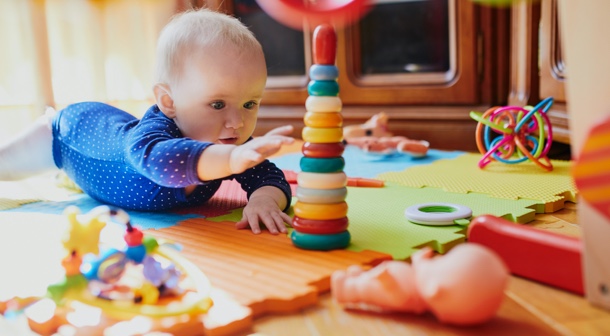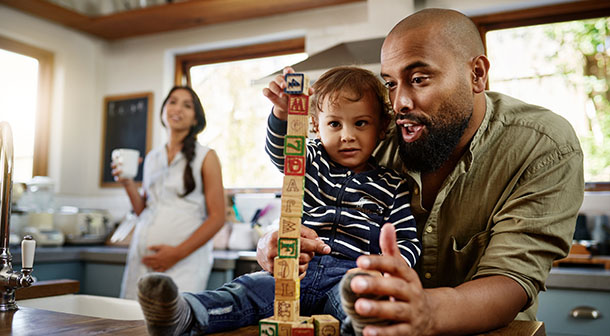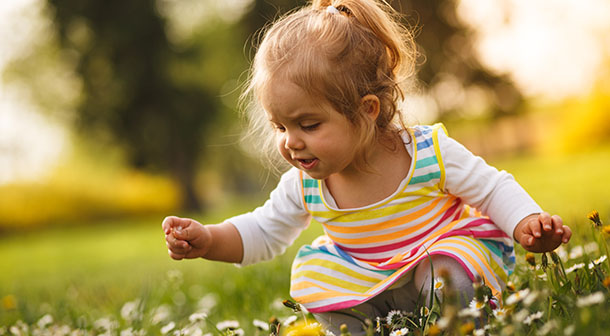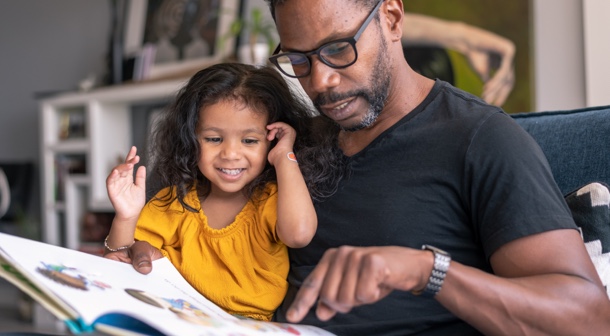Your baby's brain grows rapidly until about the age of 3. During this critical time, parents can do many things to promote healthy baby growth, including positive brain development. You don't need anything complicated or expensive to help your child's brain grow and develop. Nutritious food, playtime, cuddling, talking, singing, and laughing together will help your baby's brain grow, learn, and thrive!
For a quick introduction to baby brain development, watch this video.
Child Brain Development
Early baby learning sets the stage for your child's success. It helps him (or her) develop emotionally and become a more successful learner. Finding ways to help your baby learn is not only important - it can be fun, too! Here are five parenting tips for stimulating positive baby brain development.

1. Let's talk nutrition.
Babies need nutritious foods for their brains to grow - but you don't need a cookbook to give your baby good nutrition. All you need is a basic understanding of baby development milestones and ideas for healthy eating.
Baby's First 6 Months
During the first 6 months, it's all about a nutritious liquid diet. This can be breastmilk, formula, or both. Hold off on introducing solids until your baby can sit upright with support, usually between 4 to 6 months.
Breastmilk has the best mix of nutrients for newborn babies. Breastfeeding supports a baby's immune system and protects against health problems ranging from obesity to diabetes. Plus, new studies show breastmilk is rich in biochemicals that are important for baby brain growth.
Don't feel bad if you can't breastfeed or you aren't producing enough milk for your baby. Lactation consultants can help moms who have breastfeeding challenges and the service is often covered by insurance. You can also search your city or town for breastmilk banks that offer donated breastmilk.
WIC is a nutrition program for pregnant, breastfeeding women and families with children younger than 5. Visit Texaswic.org to see if you qualify for these services.
If you are using formula, make sure to choose one fortified with iron. Baby brain growth needs iron for healthy red blood cells. Many newborns have anemia in the first few months of life because the baby's body is growing faster than it can produce red blood cells. Red blood cells are necessary to carry oxygen to the brain, organs, and muscles. Anemia cause babies to be less active and fussy. Iron-fortified formulas can help.
6 Month Milestone
When baby reaches his 6 month milestone, it's time to introduce solid foods. This includes "baby food" or foods that are easy to chew. Support baby's brain growth with healthy foods like berries, beans, vegetables, and meats in puréed form. A purée (or mash) is cooked food blended into semi-liquid paste, like applesauce or hummus. You can buy pre-pureed baby foods, or even mash and blend foods like bananas, avocados, or sweet potatoes yourself.
7 Month Milestone
From 7 months onward, start offering baby more textures, like soft carrot chunks.
12 Month Milestone
Once your baby has teeth, start replacing puréed foods with solid versions. This usually takes place usually around the 12 month milestone.

Continue offering your growing toddler the same range of brain-healthy foods in small, easy-to-chew pieces. Be sure he is getting iron and protein from meats and eggs plus plant-based sources like tofu, lentils, whole grain cereals, and green vegetables like broccoli or leafy greens.
When putting together a plate for your toddler, get creative! Include as many colors of the rainbow as possible on the plate, from the green of peas to the yellow of squash to the red or purple-blue of berries. It's okay if your child doesn't eat things on the first try. Give it some time and be patient.
Child Brain Development: Ages 0-3
2. Bring on the bonding.
How your baby feels emotionally can affect your baby's brain growth. Feeling secure, loved, and cared for stimulates healthy baby brain development and attachment. Your actions speak louder than words - but don't forget to talk to your baby! Below are some ideas for brain-healthy baby bonding.
Get lost in their eyes.
Your instincts as a loving parent can be exactly what your baby's brain needs. Babies respond to voices, body language, and facial expressions. Looking into your baby's eyes provides what his brain needs most - the presence of a caring person.

Enjoy baby bonding.
This can be as simple as eye-gazing, the comfort of skin-to-skin contact, and emotional responsiveness. As you respond to your baby in these ways, you'll notice what comforts or delights him.
For example, he may love being walked or rocked. Maybe he enjoys gazing at twinkling lights, feeling a cool breeze, or hearing soothing sounds. As you watch your baby, you'll find ways to comfort or distract him when he becomes startled or upset.
When a child feels secure, it stimulates baby brain development by helping the frontal lobe, or the front part of the brain, grow. You can promote brain growth by letting your baby know you are there to meet his needs.
Don't stress.
Whether you're wiping his nose, changing yet another diaper, or trying to cope with him when he's upset, do your best to stay confident and caring. If you get frustrated, just remember that healthy relationships, experiences, and environments early in life improve your child's well-being later in life.
Parenting can be challenging, and keeping calm can be tough. It's important to take deep breaths, take your time, and be kind to yourself. You've got this!
3. Time to get visual.
Babies need to look at things on a regular basis. This helps their vision develop correctly, and helps their brain grow by encouraging exploration and discovery. Adapt the way you play with your baby according to his monthly milestones. Here are four visual play ideas.
Newborn to 9 Month Milestones
For the age 0 to 9 month milestones, you can help improve your baby's vision by looking into his eyes, making faces, and seeing how he responds. During this period he will start to grab objects. Show him toys that are different sizes, colors, shapes, and textures that he can touch. Once he's sitting up with a little help, he'll enjoy a safe floor space where he can pick up objects to look at. Give him toys to feel, stack, and bang together.

9 Month to 12 Month Milestones
During the 9 month milestones to 12 month milestones, let your curious little guy touch your face. Point to your eyes, ears, nose, and mouth - and point to baby's features, too. Play peek-a-boo or hide a colorful object and then reveal it. Let him practice dropping objects and picking them up. Begin to share books with him. Even if a book has no words, show him the pictures and talk about what he's seeing.
12 Month to 18 Month Milestones
As he gets older, he will need interactions that improve his visual skills. As your child hits the 12 month milestones through 18 month milestones, he will need a safe place to toddle and pick up objects to look at. He will begin to enjoy toys that build hand-eye coordination like chunky puzzles, stackable blocks, or shape sorters.

18 to 24 Month Milestones
During the 18 month milestones through the 24 month milestones, try moving more and getting outdoors. Do silly dances and watch as he attempts to copy you. Let him explore dirt, sand, and water with shovels, buckets, and other tools. Go on a nature walk and let him point out, touch, and talk about the things you find. Exploring paints and colors is another fun thing to try!

4. Get verbal.
One of the most important things you can do to stimulate healthy baby brain development is to talk to your baby. The number of words he hears in the first three years of life is critical, as vocabulary is one of the indicators of success in school and in life. The good news is that you can stimulate baby learning and language development from day one.
Here are some verbal play ideas:
Newborn to 9 Month Milestones
As your baby masters the 0 to 9 month milestones, increase his word count by talking, singing, and reading as much as you can. As you move around the room, talk and watch him turn to find you by sound. Reward your little communicator with fun faces and verbal responses. Point out the couch, the light switch, kitchen, and more. Don't forget to read, and not just books - a magazine cover, a menu, words on a sign - anything you see. If you have a picture book, make up your own story or describe the pictures to him.
9 Month to 12 Month Milestones
By the time he reaches his 9 month milestones through 12 month milestones, he will be more engaged. Stimulate baby learning by copying him whenever he makes sounds. Repeat any words he says back to him. Sing songs. Show him hand motions to go with the music. Give him a variety of toys and describe what they look like and what they do. When you give him a new word, like "excitement", be expressive so he can see what excitement looks like. Ask him questions and engage in a conversation, even if you can't really understand him.
12 Month to 18 Month Milestones
During the 12 month milestones to 18 month milestones, he may be quite the conversationalist. Have frequent talks with him. Make it a game to introduce new words using gestures and facial expressions to help him understand the words. Ask questions and see how he responds. Introduce him to other kids. Notice how he plays and talks.
18 Month to 24 Month Milestones
When he reaches the 18 month to 24 month milestones, he will start putting two to four words together, which means he may start telling you simple stories. Encourage him to explore all his senses by asking questions like, "What do you see? Hear? Taste? Smell? Feel?" Encourage his conversation skills by repeating back what he says in complete sentences: "You are thirsty. Yes, I will get you some milk." Responding to him in sentences will make him feel like he is a real communicator. Because he is!
Need parenting help now?
The Texas Parent Helpline is available 24/7.
- Call 833-680-0611
- Chat with us
- Text 833-680-0611
Three Year Milestone
As your child continues to grow and reach the 3-year milestone, make a point of using new and interesting words. Introduce a new word by showing him an example, such as a new food on his plate at mealtime, or a picture during playtime or story time - it's easier for a child to understand what a kite is, for example, when he can see what it looks like. Singing, making up rhymes, and daily reading are also great ways to teach new words. Books with pictures can help your child understand new words more easily as you point to pictures and tell him what the items are called. When he's around other kids, encourage him to talk them by asking questions and watching them respond.

5. Keep calm and carry on.
Healthy baby growth isn't all about stimulating your baby's brain, it's also about protecting his brain from overstimulation. Too much sensory input can cause stress that slows baby brain growth, which can affect learning and social-emotional skills later in life. Below are three ideas for protecting the brand-new human you are raising from life's stressful experiences.
Sleep
Sleep is healing for the brain. Good sleep will help your child's brain organize the day's experiences and replenish neurotransmitters that will help him remember, learn, and problem-solve. Sleep also flushes out toxins associated with stress.
Be sure your child has a quiet, restful place to sleep. Loud noises or sustained tension can cause him to become overstimulated and prevent him from winding down when it's time to sleep. Whether it's closing doors quietly, calming a barking dog, turning down loud music, or switching the television off, try to provide him a calm, safe space to rest.
White noise may help create a calm environment. Phone or tablet apps and white-noise machines can create a womb-like environment that helps babies fall asleep more easily and stay asleep longer.
Rituals and Routines
Give your child the gift of rituals and routines . Over time, consistent patterns of meal, play, and rest help baby brain development by teaching babies what comes next.
As you transition from one activity to another, think about saying or doing the same things each time. Creating little rituals around life's daily routines can give your baby more ability to predict what's next. It can be as simple as letting him touch or hold a bath towel as you fill the bathtub or pausing to stretch up to the sky before sitting down to play.
Whether you cuddle in a rocking chair, turn the lights low together, or tell a story, bedtime rituals can be especially helpful. Consistent words or actions can help your child's busy brain and body wind down, signaling that it's time to rest and recharge.
Overstimulation and Stress
As much as you try to protect your baby from overstimulation or stress, it's impossible to do so 100% of the time. He will become overtired, startled, scared, or exhausted. That's ok. If he is startled or stressed by an experience, take him to a safe place to soothe him. For a baby in any of the age 0 though 12 month milestones, simply holding, rocking and singing, or murmuring words of comfort can be enough.
Remember, a baby's brain grows each day during the first three years of life. All it takes is one look into your baby's eyes as he intently watches you to realize there's a lot going on in his little head. The exciting news is that you have the power to help his brain grow in a healthy, happy way. Feed him healthy foods, be emotionally responsive to him, stimulate visual and verbal skills as he moves through each developmental milestone, and be there to help him recharge and avoid overstimulation.
While it may feel silly to have constant conversations with a baby who can't talk or a toddler who is difficult to understand, filling his first three years with healthy, brain-stimulating experiences is a gift for life. If you run short of baby brain development ideas, keep this list handy as a quick reminder.




